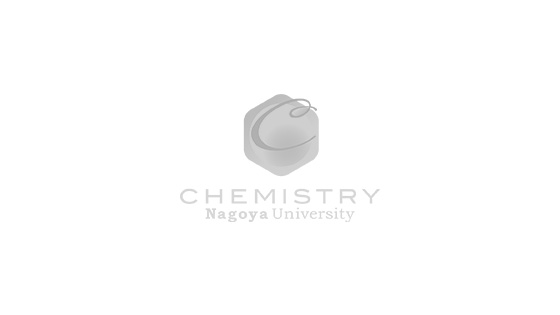The Chemistry Department conducts research and education through 10 research laboratories and 1 research group. These include laboratories in organic chemistry, physical chemistry, and inorganic/analytical chemistry.

Organic Chemistry Laboratory (Organic Chemistry Laboratory)
Organic Chemistry Laboratory
Creating Value by Connecting Molecules: Synthetic Chemistry
Our dream is to harness the power of synthetic chemistry to bring groundbreaking functional molecules into the world. With this ultimate goal in mind, we conduct research in materials synthesis based on new synthetic chemistry catalyzed by catalysts.
Functional Organic Materials Laboratory (Yamaguchi Group)
Functional Organic Materials Laboratory
Challenging the Creation of Innovative Functional Molecules
In molecules, σ electrons play a fundamental role in connecting atoms and forming the molecular framework, while π electrons determine the electronic properties of molecules such as color, luminescence, electronic properties, and magnetism. Many functional molecules in nature are accompanied by π electrons, creating diverse functions such as bioluminescence, photosynthesis, and color perception.
Bioorganic Chemistry Laboratory (Abe Group)
Bioorganic Chemistry Laboratory
Development of nucleic acid drugs based on chemistry.
I am researching the design principles of bioactive molecules and functional molecules that influence biological phenomena from both organic chemistry and molecular biology perspectives. Specifically, I am synthesizing nucleic acid derivatives and developing methods for controlling protein functions and gene expression with a focus on drug discovery. The synthesis by organic chemistry and functional evaluation by molecular biology are unique aspects of research in our laboratory, which is well-versed in both fields.
Noyori Laboratory (Saito Group)
Noyori Laboratory
Challenging the Achievement of “Perfect Chemical Reactions”
Achieving a “perfect chemical reaction” with a 100% yield and 100% selectivity is not only academically significant but also lays the foundation for future chemical industries. Furthermore, transitioning industrial processes from immature chemical reactions that have continued to erode the Earth’s environment to perfect chemical reactions is a societal demand for chemistry.
In our special laboratory, we are working towards achieving perfect chemical reactions by exploring new reagents and catalysts based on organometallic chemistry.
Advanced Materials Laboratory (Awaga Group)
Advanced Materials Laboratory
Research in Organic Electronics
In the Physical Chemistry Laboratory, we propose organic electronics incorporating new structures such as interface electric double layers using distinctive molecules like organic radicals cultivated in molecular property studies. Additionally, we are advancing research to extract novel molecular properties by utilizing device structures.
Photo-Physical Chemistry Laboratory (Hishikawa Group)
Photo-Physical Chemistry Laboratory
Exploration of Novel Phenomena and Material Control Using Extreme Light
In the Optical Physical Chemistry Laboratory, we aim to visualize femto- to attosecond molecular dynamics in the visible region using cutting-edge spectroscopic techniques, harnessing the properties of coherent light. We are also advancing research towards the exploration and control of novel chemical reaction processes using high-intensity laser pulses with controlled waveforms as reaction fields. Our goal is to pave the way for new developments in material science.
Quantum Chemistry Laboratory (Yanai Group)
Quantum Chemistry Laboratory
Theoretical Chemistry Using Computers and Its Digital World
In our laboratory, we advance theoretical research utilizing state-of-the-art quantum chemical computational methods. We conduct research and development on advanced theories, algorithms, and high-performance software with higher adaptability for challenging problems in chemical electron theory. We aim to maximize the power of computation to tackle the problems faced by experimental researchers and unravel the mysteries of unknown chemistry and biochemistry, ultimately aiming to derive principles and theories.
Molecular Architecture Laboratory (Tanaka Group)
Molecular Architecture Laboratory
Creating New Molecular Functions by Organizing Molecules into Structures
In the Molecular Organized Chemistry Laboratory, we aim to construct new artificial functional molecular systems by organizing various molecules such as organic molecules, metal complex molecules, polymers, and biomolecules. For example, we are challenging the creation of a liquid with countless small pores of molecular size to create a new reaction field and organizing metal complexes at a higher order to create new catalysts for energy conversion.
Inorganic Chemistry Laboratory (Tada Group)
Inorganic Chemistry Laboratory
Creating Catalysts and Observing the Form and Function of Catalysts
The substances used in our daily lives are made from limited resources on Earth, and catalysts play a significant role in their synthesis. In the Inorganic Chemistry Laboratory, we focus on the keyword “catalyst” to create new inorganic compounds and develop new materials with excellent catalytic properties. In particular, we are advancing the development of new catalyst materials for fuel cells, which are essential for electrode catalysts in fuel cells, while elucidating various phenomena and issues that occur in fuel cell cells during power generation from the basics.
Bioinorganic Chemistry Laboratory (Shoji Group)
Bioinorganic Chemistry Laboratory
Aiming to Understand and Apply Proteins that Govern Biological Activities
In the Biological Inorganic Chemistry Laboratory, we are developing new material conversion systems and molecular recognition methods using metal proteins and artificial nucleic acids. Our laboratory is developing methods to incorporate fake substrates targeted by metal enzymes as enzyme activation molecules and to significantly change the function of naturally occurring metal proteins by replacing the metal complexes that are essential for their function with synthetic metal complexes.

Organometallic and Materials Chemistry Group (Nambo Group)
Organometallic and Materials Chemistry Group
Diverse Material Conversion and Function Creation by Organic Molecules and Metals
Organometallic chemistry is a field that merges the characteristics of organic molecules and metal elements, holding the potential to create entirely new functionalities. In our research group, we aim to achieve truly efficient molecular construction by developing innovative catalysts and reagents based on organometallic chemistry, enabling revolutionary molecular transformations. Additionally, we are leveraging our expertise to collaborate with biologists in developing new molecular tools through fusion research.
